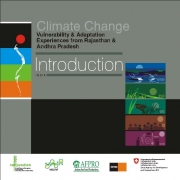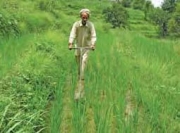/regions/mahbubnagar-district
Mahbubnagar District
Groundwater as commons demonstrated in Mahbubnagar, Telangana
Posted on 08 Jul, 2015 05:37 PMBy the year 2000, farmers in Mahbubnagar, Telangana could see how risky their investments on groundwater had become. The area barely received 600 mm of annual rainfall, and just 15 percent of its area was under irrigation.

Sustainable resources management for food security and sustainable livelihoods - Action - A Newsletter of AFPRO
Posted on 30 Oct, 2011 07:46 AMThese technologies include soil and water conservation measures, integrated farming, diversion based irrigation systems, sustainable agriculture, tree-based farming to name a few.
Dynamics of soil fertility management practices in semi-arid regions - A case study of Andhra Pradesh - EPW
Posted on 23 Jan, 2011 10:41 AMIt also attempted to examine how policy interventions threatened this knowledge base and the sustainable practices it supported.
Climate change: Vulnerability and adaptation experiences from Rajasthan and Andhra Pradesh – A report by SDC
Posted on 05 Jan, 2011 06:44 PM This document discusses the process oriented programme of Swiss Agency for Development and Cooperation (SDC) on Vulnerability Assessment (V&A) and Enhancing Adaptive Capacity to Climate Change initiated in the semi-arid regions of India. The aims of this programme include strengthening the resilience of local communities to conditions of unfavourable weather, like adverse alterations in temperature and precipitation leading to the more frequent occurrence of drought and to use the experiences for policy development for climate change adaptation measures at various levels.
This document discusses the process oriented programme of Swiss Agency for Development and Cooperation (SDC) on Vulnerability Assessment (V&A) and Enhancing Adaptive Capacity to Climate Change initiated in the semi-arid regions of India. The aims of this programme include strengthening the resilience of local communities to conditions of unfavourable weather, like adverse alterations in temperature and precipitation leading to the more frequent occurrence of drought and to use the experiences for policy development for climate change adaptation measures at various levels.
Over 60 per cent of the cultivated area in India is rainfed & unfavorable and uncertain rainfall patterns will seriously affect the food, drinking water and livelihood security of millions of children, women and men. Since the initiation of this project, the emphasis on proactive research on adaptation mechanisms has increased at the national level.
The present decade may mark the beginning of a new climate era, characterized by extreme and often unpredictable weather conditions and rise in sea levels. The greatest casualty of climate change will be food, water and livelihood security.
Farmers experiences on System of Rice Intensification in India – A report by ICRISAT-WWF
Posted on 14 Dec, 2010 08:29 PM This report on farmers’ experiences on System of Rice Intensification (SRI) in India by ICRISAT and WWF is an effort to compile the experiences of those farmers who pioneered the SRI method in various regions. They experimented in their own way, articulating their point of view on the method.
This report on farmers’ experiences on System of Rice Intensification (SRI) in India by ICRISAT and WWF is an effort to compile the experiences of those farmers who pioneered the SRI method in various regions. They experimented in their own way, articulating their point of view on the method.
The SRI is a national phenomenon in India and rice-cultivating farmers, particularly those who have less than one hectare of land, have experimented, refined, adopted and are promoting SRI. It is their hard work and trust that has spread this unknown method into all rice-growing states. Out of 564 rice-growing districts in India, SRI is being practiced by the farmers in about 216 districts.
Flood Assessment Report of Mahabubnagar District - II
Posted on 16 Nov, 2009 10:54 AMNow that the media has stopped taking interest in the devastating floods that made news in early October, you must be wondering what must have happened to the people who were badly affected by the floods !
Assesment report in Mahbubnagar district
Posted on 12 Oct, 2009 11:18 PMAttached is an assesment report of the status in Mahbubnagar district created by a team of civil society representatives. The report makes reference to a networking effort of civil society organisations in order to co-ordinate their efforts, and the team promises to continue to survey the situation and make periodic reports.
The Andhra Pradesh farmer managed groundwater system project
Posted on 14 May, 2009 12:23 PMThe Andhra Pradesh Farmer Managed Groundwater System (APFAMGS) project is an enabling intervention for managing groundwater depletion through voluntary self regulation. The project has demonstrated its impact in 7 districts of Andhra Pradesh spread over 650 villages, on a significant scale. Read more